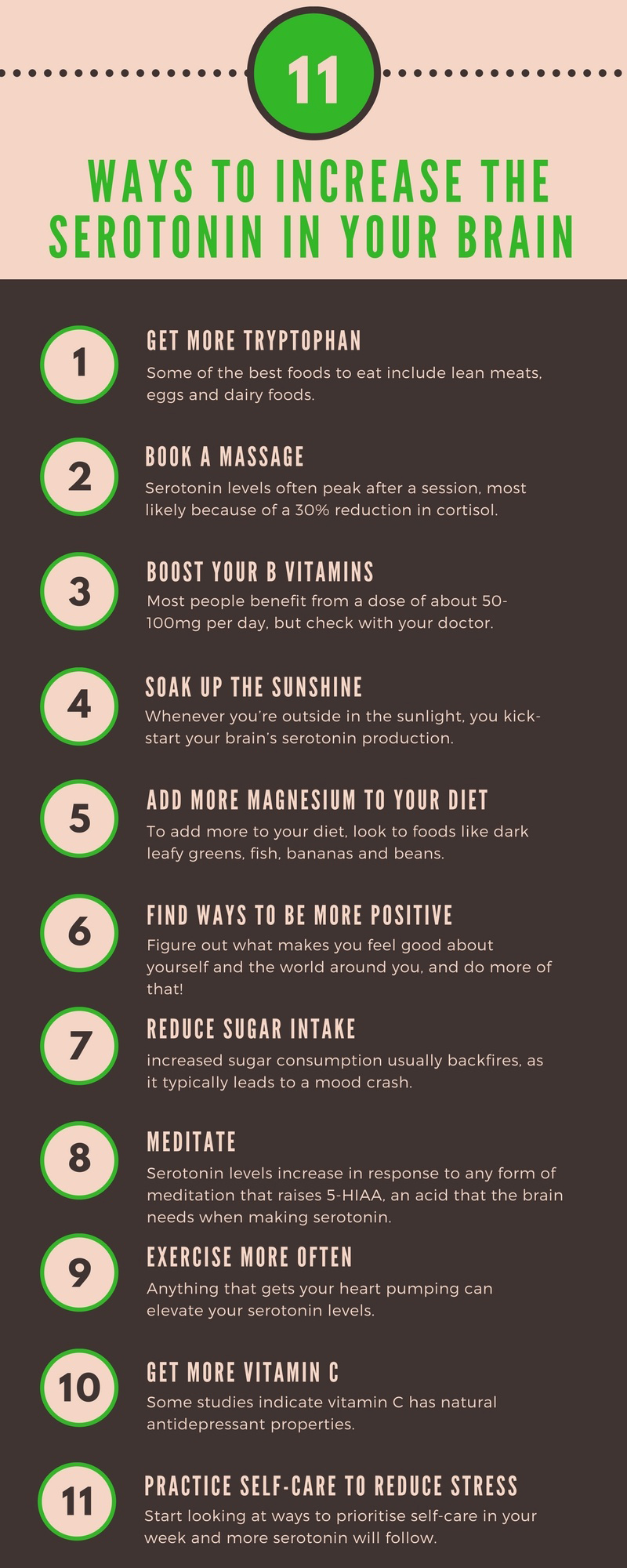While anti-depressants are often the medical go-to choice for increasing serotonin, they often have undesirable side effects like low libido and low energy. However, recognizing some natural ways that your body can make serotonin and obtain plenty of the important co-factor, vitamin B6, may free you from needing to rely on long-term use of prescription drugs. If you decide to go this route, it can be helpful to work with a creative licensed practitioner who understands the power of food to influence your body’s biochemical processes.
call us today and schedule your consultation
(479) 636-1324
1. Get More Tryptophan
Firstly, you need to know about tryptophan. It’s an amino acid that’s vital in the production of serotonin, so if you increase your dietary intake then you put yourself on the fast track to happier days.
Some of the best foods to eat include lean meats, eggs and dairy foods, but don’t fret if you’re on a vegan diet! Nuts and seeds are also packed with tryptophan, so make them a staple snack.
2. Book A Massage
You might already have a sense that a massage can influence your mood, but you probably don’t know that this isn’t just the result of working out muscular tension.
Research on how massage changes body chemistry suggests that serotonin levels often peak after a session, most likely because of a 30% reduction in cortisol. When too much of this hormone is circulating around your system, your brain is actually blocked from making the right amount of serotonin. (479) 636-1324, call and check schedule availability for your massage today.
3. Boost Your B Vitamins
Every vitamin in the B family helps you feel good and plays a role in keeping your body fit but there are two particularly useful ones when it comes to serotonin production—vitamins B12 and B6. There’s even evidence that B vitamin supplementation can help to treat depression in the elderly population. Most people benefit from a dose of about 50-100mg per day but check with your doctor (and don’t be afraid to ask for a blood test in case you have an underlying vitamin deficiency). (479) 636-1324, we offer a full line of supplements and complementary medicine as well as food sensitivity and metabolic profile testing.
4. Soak Up The Sunshine
Whenever you’re outside in the sunlight, you kick-start your brain’s serotonin production. This is true even if there’s some cloud cover, so there’s no excuse to stay inside all day in winter!
Do your best to spend at least 20-30 minutes outside every morning or afternoon—this is a great opportunity to go somewhere beautiful, or just reflect while listening to your favorite songs.
5. Add More Magnesium To Your Diet
You may not give much thought to magnesium, but some reports estimate that as many as 75% of the American population could be deficient in this mineral. It’s not only capable of influencing serotonin balance, but also helps to control blood pressure and regulate nerve function.
In supplement form, it has been shown to help some patients recover from even major depressive episodes. To add more to your diet, look to foods like dark leafy greens, fish, bananas and beans.
6. Find Ways To Be More Positive
Increasing the brain’s serotonin levels isn’t just about external things like diet and environment—psychological studies show you can also influence neurotransmitter production by working to change your attitude to life. Figure out what makes you feel good about yourself and the world around you, and do more of that! Good examples include socializing with people you love, allocating an hour a day to an inspiring hobby, deliberately visualizing a happy event, and keeping a gratitude journal.
7. Reduce Sugar Intake
Interestingly, one of the major symptoms of low serotonin is a craving for sugary foods—this is because insulin is needed to manufacture some of the components of serotonin. Unfortunately, this increased sugar consumption backfires, as it typically leads to a mood crash (counteracting the benefits of the helpful neurotransmitters you’ve just produced). Protect yourself from illnesses like diabetes and heart disease, and focus your efforts on healthier ways of increasing serotonin.
8. Meditate
Yes, we know, meditation comes up in every list that relates to well-being! However, there are good, evidence-based reasons for this—meditating really can help just about every area of your life. Serotonin levels increase in response to any form of meditation that raises 5-HIAA, an acid that the brain needs when making serotonin.
As a bonus, meditation combats the influence of stress hormones, which not only makes you feel happier but also reduces unnecessary inflammation in the body. (479) 636-1324, call and ask about scheduling for our next meditation class.
9. Exercise More Often
You’ll already be getting a bit more exercise if you follow the above advice about sun exposure, but take a critical look at the rest of your week and see if you can make time for extra workouts. Anything that gets your heart pumping can elevate your serotonin levels, and the associated endorphins make you feel fantastic as well. Think outside the box to find types of exercise that you actually find fun—for example, swap the treadmill for jogging through the park, attending a dance class or learning water aerobics.
10. Get More Vitamin C
While vitamin C doesn’t seem to be as crucial to serotonin as B vitamins, there is some emerging research showing an increasingly strong connection with mood. For example, some studies indicate vitamin C has natural antidepressant properties, and one group of scientists even found that people who increased vitamin C felt happier within just a week. This may not only be to do with serotonin but also vitamin C’s role in producing other neurotransmitters like dopamine and epinephrine—both of which make us feel good. Oranges, bell peppers and tomatoes and leafy greens are all excellent choices if you want to get more vitamin C.
11. Practice Self-Care to Reduce Stress
Finally, you’ve probably noticed that ways of regulating cortisol have come up a few times because cortisol blocks serotonin from being made in the first place. This means that essentially, anything you can do to reduce stress levels can have a positive knock-on effect on the amount of serotonin in your brain.
If you’re the type of person who puts others first, takes on too much and is constantly working, start looking at ways to prioritize self-care in your week and more serotonin will follow. Self-care means different things for different people, but you can brainstorm good ideas by making a list of ten things that make you feel truly happy!


